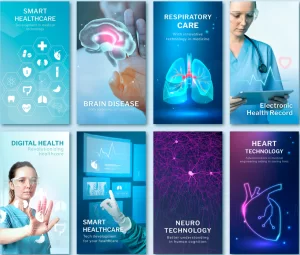When it comes to the future uses of Artificial Intelligence (AI) in some areas, the surprise of its application in new fields seems to outweigh the certainty of its already established uses. AI in healthcare is an evolving example of this trend.
AI in healthcare has an established use in image analysis, automated reports and intelligent systems that help doctors diagnose. However, the rapid evolution of technology has opened doors to innovative and surprising applications.
Artificial Intelligence Generative in Health: Reinventingnding doctor-patient communication
A recent example shows how important Generative Artificial Intelligence in healthcare (Generative AI) has been in improving communication between doctors and patients, as reported in an article on the subject in the New York Times.
ChatGPT, for example, has been used to help doctors find the right words to convey difficult news, express concerns about a patient’s suffering or simply explain medical recommendations more clearly.
In addition, Generative AI in healthcare is being used to improve efficiency in medical processes. Technology has been used to take over time-consuming tasks, such as writing appeals to health insurers or summarizing patient notes.
Generative AI in the Context of Humanized Medicine
Considering humanized medicine, we must remember that it is in the interaction that doctors obtain crucial information about patients’ symptoms and concerns, and it is also where they communicate diagnoses and treatment plans.
However, effective communication in medicine can be challenging, as doctors often need to convey complex and technical information in a way that patients can understand, and they also need to be able to express empathy and compassion in difficult situations.
Generative AI in healthcare has the potential to help improve doctor-patient communication in a number of ways.
Language models (LLM | Large Language Model) implemented in solutions such as ChatGPT from OpenAI, Microsoft Co-Pilot and Google’s BardIn fact, they can be used to help doctors find the right words to convey difficult news or explain complex medical concepts in a way that patients can understand.
This can help improve the patient’s understanding of their condition and treatment, which in turn can lead to better health outcomes.
This is when the convergence of technological innovation and empathy, one of the main characteristics of human nature, makes the difference.
Expressing Empathy Effectively: The Innovative Role of Technology in Medicine
Empathy is a crucial aspect of medicine, as it helps patients feel heard and understood, which can improve their satisfaction and confidence in the care they are receiving.
However, expressing empathy can be challenging, especially in stressful or emotional situations. Generative Artificial Intelligence can help by providing doctors with suggestions on how to use simple terms to express empathy effectively.
It is paradoxical that AI is helping to make medicine more humane and compassionate. After all, we’re talking about using technology to improve an aspect of health that is profoundly human.
However, it is precisely this combination of technology and humanity that has the potential to produce a more humane and compassionate medicine.
By relieving some of the burden of communication, Generative Artificial Intelligence can free up doctors to focus more fully on their patients, allowing them to be more present and attentive during interactions with patients, as well as getting rid of bureaucratic activities.
Artificial Intelligence Generative in Healthcare as a Valuable Tool to Amplify Human Connection
Ultimately, Generative AI does not replace the human connection in medicine, but it can be a valuable tool for improving it.
By helping doctors to communicate more effectively and empathetically, technology has the potential to improve the patient experience and, by extension, health outcomes.
To do this, however, it is crucial that we continue to address the ethical and safety issues that arise with the use of AI in the medical sector, to ensure that it is used in a way that benefits patients and respects their rights and dignity.
Navigating Future Challenges: Ethics and Security in Artificial Intelligence at the Medicine
As the application of “medical AI” deepens, new challenges appear on the horizon. These potential barriers are not only technical, but also structural and social, requiring a multi-sectoral approach to overcome.
One challenge that stands out is the need for interoperability between health systems.
To maximize the potential of AI in healthcare, it is vital that medical systems can share information efficiently and securely.
However, many of these computing resources still operate in silos, with different systems and data standards, which can hinder the effective implementation of Artificial Intelligence.
Another challenge is the need for adequate training.
Artificial Intelligence in the medical sector is not just a question of creating effective algorithms – it’s also about ensuring that healthcare professionals are properly equipped to use these tools.
This involves not only technical training, but also education about the ethical and social implications of using AI in medicine.
In addition, Artificial Intelligence technology is likely to face regulatory challenges. With its rapid evolution, many countries are still struggling to develop a regulatory framework that can keep up with these changes.
How can we ensure that AI in healthcare is regulated effectively to protect patients without inhibiting innovation?
Finally, there is the challenge of public acceptance.
Although AI has the potential to transform healthcare, this can only happen if patients trust this technology. We need to ensure that the introduction of innovation in health is done in a transparent way and with respect for patients’ rights.
Overcoming these barriers won’t be easy, but with collaboration, innovation and a focus on the patient, we can create a future where Artificial Intelligence in healthcare plays a key role, improving outcomes for patients around the world.
Eval – Transforming the Future with Generative Artificial Intelligence in Healthcare
With a track record of leadership and innovation that takes us back to 2004, Eval is shaping the future of technology. Our strategic investment in Artificial Intelligence positions us at the forefront of the technological revolution, enabling us to provide state-of-the-art information security solutions.
Our mission is to ensure the prosperity and protection of our clients’ businesses in the digital age. Join us on this exciting journey and discover how Eval is redefining what is possible with AI.
Innovate now, lead always: get to know Eval’s solutions and services and take your company to the next level.
Eval, safety is value.










